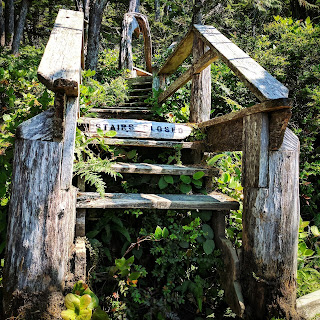As I type this blog entry it's about 11 AM here in Campanário on the island of Madeira. The upper balcony has the best view down the valley to the Atlantic ocean and sitting here affords me the fresh air and sounds of our new home. Roosters crow at each other across the valley, dogs bark at anything moving or out of place, the occasional goat bleats from one hillside or another, pigeons (or maybe a neighbor raises doves?) coo back at the roosters, and song birds chirp and warble from all directions all the time. Every quarter hour bells toll from the church tower over the hill to our right. Heavy trucks labor slowly up the road down below us, struggling up the incline as they pull out of one tunnel and run up the hill into the next tunnel. A neighbor hammers at something in his garden and someone somewhere calls someone's name. The cool breeze coming up the valley smells of the clean ozone of out-at-sea mixed with verdant and floral notes.
A happy rural seat of various view;
Groves whose rich Trees wept odorous Gumms and Balme,
Others whose fruit burnisht with Golden Rinde
Hung amiable, Hesperian Fables true,
If true, here only, and of delicious taste:
Betwixt them Lawns, or level Downs, and Flocks
Grasing the tender herb, were interpos'd,
Or palmie hilloc, or the flourie lap
Of som irriguous Valley spred her store,
Flours of all hue, and without Thorn the Rose:
- From Paradise Lost, Book 4, by John Milton
Today the horizon between sea and sky is just visible. The weather this past week has been unseasonably cold (we are told) and frequently the sea is smudged into the sky by a fat thumb of haze such the end of the valley is a wall of ombré blue. From palms to potatoes, cabbages to sugar cane, bananas to orchids, everything grows and blooms here, side by side. Most of the homes around us have large vegetable gardens terraced beside, above, or below them. Meticulous rows of well-tended crops put our little overgrown lowest-plot of land to shame. A ceder, a fig tree, and hillside scrub make up our garden so far. Give us time, good neighbors!
Our house, like most houses here, is built on the vertical. Some are arranged to flow down hill, level by level, others run up hill, and very few are single story. It's a function of the very vertical nature of the island's topography. Houses, like gardens, are terraced. Ours runs down from the road: carport at road level, kitchen/livingroom/utility down one more level, bedrooms down the next, and a smaller sitting room with fireplace at the lowest level. Each level has a balcony or terrace, all facing the same valley/sea direction.
I'm not sure how long it will take for this to really sink in, but this is our new permanent home. Well, as permanent as anything in life really isn't, anyway. A small village countryside clinging to steep sub-tropical hills on a small island way out in the middle of the Atlantic ocean; a bit of Portugal closer to Morocco than Europe.
From the balcony, glittering birds were visiblecircling an indigo stain of currentthat wound like a river through the pullucid ocean.Perhaps the current was a wake, still trailingphosphorescent from the night before,left by other, distant islands that proceed us.And beyond the current and circling birds, the horizonmarked a distance we'd cross again in the dark.Once on an island, it made no difference where we wentso long as we stayed at sea.- From Island, by Stuart Dybek
sea-fresh floral breeze,small red roofs flowing down hillsinto endless blue- Haiku, 2021-04-06 (Me)
[Note: I will commit to keeping my Finite Musing blog re-kindled and regularly active from our new location, for the two or three who might be interested.]













